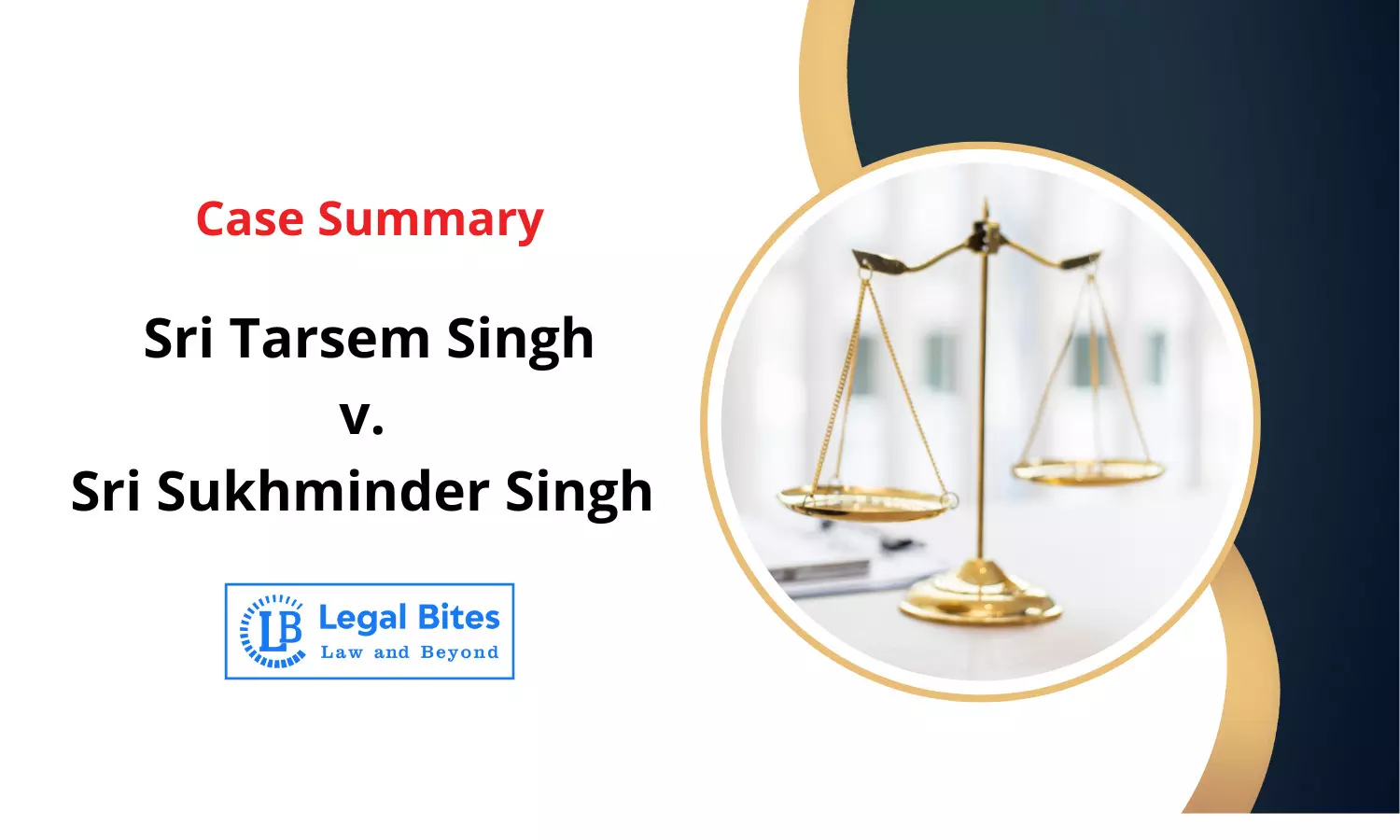Case Summary: Sri Tarsem Singh v. Sri Sukhminder Singh (1998) | Void Agreement
The judgment reaffirmed principles of mutual mistake, void agreements, and restitution under the Indian Contract Act, 1872.

The case Sri Tarsem Singh v. Sri Sukhinder Singh (1998) serves as a significant precedent in contract law, addressing the impact of mutual mistakes on the validity of agreements and the equitable remedies available when contracts are deemed void.Title of Case: Sri Tarsem Singh v. Sri Sukhminder Singh Citation: (1998) 3 SCC 471Court: Supreme Court of IndiaDate of Judgment: February 2nd, 1998Bench: Justice S. Saghir Ahmad and Justice M. Jagannadha RaoBackgroundThe case arises...
The case Sri Tarsem Singh v. Sri Sukhinder Singh (1998) serves as a significant precedent in contract law, addressing the impact of mutual mistakes on the validity of agreements and the equitable remedies available when contracts are deemed void.
Title of Case: Sri Tarsem Singh v. Sri Sukhminder Singh
Citation: (1998) 3 SCC 471
Court: Supreme Court of India
Date of Judgment: February 2nd, 1998
Bench: Justice S. Saghir Ahmad and Justice M. Jagannadha Rao
Background
The case arises out of a contractual dispute concerning the sale of agricultural land measuring 48 Kanal 11 marlas located in Panjetha, Tehsil, and District Patiala. The petitioner, Sri Tarsem Singh, agreed to sell this land to the respondent, Sri Sukhinder Singh, at the rate of ₹24,000 per acre. The agreement was executed on May 20, 1988, with an advance payment of ₹77,000 as earnest money. The sale deed was to be executed by October 15, 1988, upon payment of the remaining balance of the sale consideration.
The agreement stipulated that failure by the respondent to pay the balance would result in forfeiture of the earnest money. Disputes arose when the petitioner allegedly refused to execute the sale deed, leading to the respondent’s filing a suit for specific performance of the contract.
The trial court decreed in favour of the respondent, granting specific performance of the contract. However, the petitioner appealed against the judgment. The Punjab and Haryana High Court dismissed the petitioner’s second appeal, upholding the appellate court’s findings and decree for refund.
Issues
- Whether the mutual mistake regarding the area of land and the rate of sale consideration rendered the agreement void under Section 20 of the Indian Contract Act, 1872.
- Whether the forfeiture clause in the agreement could be enforced despite the agreement being declared void.
- Whether the appellate court and the High Court erred in passing a decree for refund of the earnest money under Section 65 of the Indian Contract Act, 1872.
- Whether the respondent's failure to fulfill contractual obligations barred him from seeking relief in the form of a refund or specific performance.
Supreme Court Findings
Mutual Mistake and Void Agreement: The Supreme Court upheld the findings of the lower courts that both parties suffered from a mutual mistake of fact regarding the area of the land and the rate of sale consideration. Under Section 20 of the Indian Contract Act, 1872, an agreement is void if both parties are under a mistake as to a matter of fact essential to the agreement. Since the area and price were integral to the contract, the mutual mistake rendered the agreement void.
Impact on Forfeiture Clause: The forfeiture clause in the agreement could not be enforced as the entire agreement was void. A void agreement cannot be partially enforced, and no clause within it, including a forfeiture provision, can be upheld independently unless it constitutes a severable and valid contract, which was not the case here.
Section 65 of the Indian Contract Act: Section 65 provides that when an agreement is discovered to be void, any party who has received an advantage under such an agreement is obligated to restore it or compensate the other party. Applying this principle, the petitioner was required to refund the ₹77,000 received as earnest money since the agreement was void ab initio.
Definition of Mistake and “Discovered to be Void”: The Court elaborated that the phrase “discovered to be void” includes situations where the agreement was void from its inception but the void nature was realized later. Here, the mutual mistake regarding the area and price of the land came to light during litigation, satisfying the conditions of Section 65.
No Specific Performance: The Court reiterated that the specific performance of a contract cannot be decreed when the parties are not “ad idem” (in agreement) on essential terms. The uncertainty over the land’s area and price prevented the enforcement of the contract.
Refund with Interest: The Court upheld the appellate court’s direction for refund of the earnest money with 6% interest per annum from the date of the agreement until repayment, considering the petitioner’s legal obligation under Section 65.
Legal Principles Discussed:
Essentials of a Valid Contract (Section 10, Indian Contract Act): A contract requires free consent, competence of parties, lawful consideration, and lawful object. The absence of free consent due to mutual mistake renders an agreement void.
Mutual Mistake (Section 20): When both parties are under a mistake of fact essential to the agreement, the agreement is void. Unilateral mistakes are not covered under this provision.
Restitution (Section 65): A party receiving an advantage under a void agreement must restore it or compensate the other party, emphasizing the equitable principle of restitution.
Forfeiture Clause: A forfeiture clause cannot survive if the underlying agreement is void. The enforcement of such a clause depends on the validity of the agreement.
Precedents Cited
Thakurain Harnath Kuar v. Thakur Indar Bahadur Singh (1922): The Privy Council ruled that agreements discovered to be void due to mutual mistake require restitution under Section 65.
Ram Chandra Misra v. Ganesh Chandra Gangopadhya (1917): The Calcutta High Court held that an agreement entered into under a mutual mistake becomes void upon discovery, entitling the aggrieved party to a refund of money advanced.
The Supreme Court dismissed the petitioner’s Special Leave Petition and upheld the lower court’s decree for a refund of ₹77,000 with interest. The judgment reaffirmed the principles governing void agreements, mutual mistakes, and restitution under the Indian Contract Act. The Court’s decision emphasized that no party can benefit from an agreement discovered to be void due to essential factual errors and upheld the equitable principles underlying the law of contracts.
Click Here to Read the Official Judgment
Important Link

Ananya Gupta
Ananya is an alumnus of the prestigious Government Law College, Mumbai, specializing in Corporate Law. A passionate legal scholar, she is deeply involved in research, focusing on corporate governance and regulatory frameworks.
